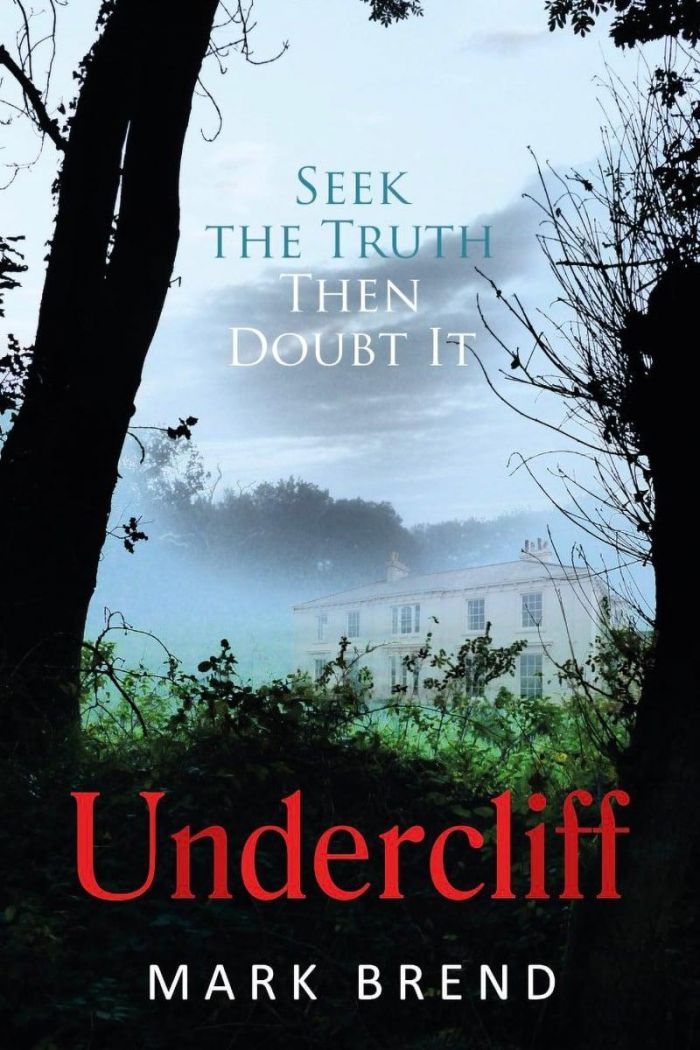Undercliff by Mark Brend (Review)

It’s 1972 and Martyn Hope — the narrator of Undercliff — is drifting through life. His marriage has failed, he has no family to speak of, and his job provides no real satisfaction. He moves back to London with dreams of writing a novel, but hardly spends any time writing once he’s arrived. His life isn’t terrible, but neither does it have any direction or purpose. And then he meets the Olive Grove.
At first, it seems like an answer to prayer (though Martyn’s not exactly the most devout type). A small religious community inspired by the Jesus Movement in the States, the Olive Grove introduces a much-needed sense of community into Martyn’s life. He even begins a burgeoning relationship with another member named Amelia, and for a time, it looks like he’s found a place to belong, a place where he’s welcomed and needed.
However, Martyn can’t shake his own growing skepticism, which begins with the Olive Grove’s leaders — a pair of enigmatic men named Magnus and Simon that everyone else calls “The Two.” Despite finding community, purpose, and love within the Olive Grove, Martyn continues to feel like the odd man out, even after the Two choose to initiate him into their inner circle and greatest secrets.
Which is when Martyn’s life begins to unravel. The Two seem to be spying on him, Amelia disappears and nobody knows where she went (or seems to care about her absence), and after he’s attacked, Martyn becomes convinced that his life is in danger — a fear that seems confirmed when his flat mysteriously burns down.
I hesitate to call Undercliff a supernatural thriller. It does contain supernatural elements, especially when Martyn begins his initiation and learns some odd details about the Two. However, it’s too slow and subtle to rightfully be called a thriller. Indeed, Undercliff can seem anticlimactic at times, its confrontations between good and evil on the slight, even ambiguous side (including a final showdown that doesn’t quite feel as such).
The more I read the novel, though, the more I became reminded of Haruki Murakami — if Murakami wrote novels situated in the drizzly British countryside. Much of that is due to author Mark Brend’s blending of the ordinary and prosaic with hints of the otherworldy, especially as Martyn goes on the run from the Olive Grove and spies on their remote retreat center to find Amelia. (If you’ve read novels like The Wind-Up Bird Chronicle and Sputnik Sweetheart, then you know that the blending of the mundane and uncanny are Murakami’s stock-in-trade, as is ambivalent and alienated protagonists. All that’s missing from Undercliff is the jazz music.)
Some might find the novel’s many sequences of Martyn wandering the British countryside less than exciting. Perhaps it was because I’d recently finished Children of the Stones — which spends a lot of time in a seemingly mundane countryside, too — but I found such scenes fascinating. I found it easy to slip inside Martyn’s state of mind during them. It also doesn’t hurt that the locales in the novel are based on areas where Brend grew up, which leant them further authenticity.
But the aspect of Undercliff that I found most interesting was its references to American Christianity of the ’70s. Examples include references to Hal Lindsay (an evangelist who became popular for books like The Late, Great Planet Earth that prophesied Jesus’ immanent return) and aspects of the Jesus Movement, a ’60s movement that sought to blend Christianity with the counter-culture of the time. Premillenialism, the Rapture, Jesus people music… this stuff permeated the Christian circles that I grew up in. To be fair, Undercliff doesn’t spend a lot of ink on such things, but it was still interesting to see them appear within a distinctly British context (and left me wondering what sort of effect they had on the other side of the Pond).
For a debut novel — Brend has previously written several non-fiction books — Undercliff proves engrossing, though not necessarily for the reasons you might expect given the subject matter. If you’re looking for an “epic” supernatural conflict involving weird magickal ceremonies, cult de-programming, religious abuse, etc., then look elsewhere. It’s easy to include such topics in a manner that’s crass and exploitative, which is why I’m glad Brend chose to not go overboard. But as a subtle, understated exploration of faith, doubt, and skepticism — with some hints of the uncanny included for good measure — Undercliff’s modest scope works well.